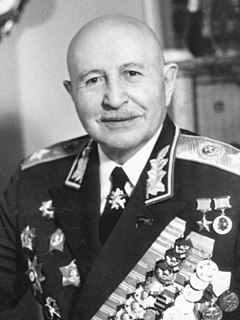A Quote by Robert Jay Lifton
While Donald Trump doesn't have any systematic ideology, he does have a narrative, and in that narrative, America was once a great country, it's been weakened by poor leadership, and only he can make it great again by taking over. And that's an image of himself as a strongman, a dictator. It isn't the clear ideology of being a fascist or some other clear-cut ideological figure. Rather, it's a narrative of himself as being unique and all-powerful. He believes it, though I'm sure he's got doubts about it.
Quote Topics
About
Again
America
Any
Been
Being
Being Unique
Believes
Clear
Country
Cut
Dictator
Does
Donald
Donald Trump
Doubts
Fascist
Figure
Got
Great
Great Country
Himself
Ideological
Ideology
Image
Leadership
Make
Narrative
Once
Only
Other
Over
Poor
Powerful
Rather
Some
Sure
Systematic
Taking
Though
Trump
Unique
Weakened
While
Related Quotes
In the Sixties, there was a big resistance to the Vietnam War. People began reinterpreting all American history as a series of misadventures and crimes and oppressions visited upon the innocent, the poor, the defenseless, the minorities, and so on. This created a new narrative in America. Let's call it, "America the inexcusable." And this narrative has been drummed into the minds of our young people. A whole generation of Americans has been taught that theirs is a bad country. And it's then very difficult for them to figure out how one can one be a good citizen in a bad country.
Whatseems to take place outside ideology (to be precise, in the street), in reality takes place in ideology. What really takes place in ideology seems therefore to take place outside it. That is why those who are in ideology believe themselves by definition outside ideology: one of the effects of ideology is the practical denegation of the ideological character of ideology by ideology: ideology never says, 'I am ideological.'
We have won on the Arlov, Kursk, Belgorod, and Kharkov grounds. We won because the country was being defended not only by the army but by the entire Soviet people. The Socialist economy, Soviet political structure, and Marxist-Leninist ideology proved their unarguable excellence against the Fascist economy, Fascist political structure, and Fascist ideology of Germany.
Donald Trump, having spent decades in the public eye as an entertainer, may not understand what the nuclear triad is, or what America's 'first use' nuclear policy is, or why starting a trade war would be a disaster. But he does understand storytelling, the power of a clear narrative, and the importance of stirring emotion.
Maybe, generations ago, young people rebelled out of some clear motive, but now, we know we're rebelling. Between teen movies and sex-ed textbooks we're so ready for our rebellious phase we can't help but feel it's safe, contained. It will turn out all right, despite the risk, snug in the shell of rebellion narrative. Rebellion narrative, does that make sense? It was appropriate to do, so we did it.
I guess the wildcard here is Terrence Malick. He supervised me while I was writing the script for Beautiful Country, and he is a genius, although not always easy to follow. What I learned from him is that the narrative can be tracked through all kinds of scenes, that the strong narrative thread is not always the one that is most obvious. Creating narrative with Malick was a bit like chasing a butterfly through a jungle. This approach to narrative is fun and complicated, something that makes the process of writing constantly interesting to this writer.
For queer people, the personal is very political, just to talk about it in a public space. It's very political just to come out and take up that space and be like, 'This is my narrative. It's not an outsider narrative, and it's not a fetish narrative; it's just my story, and it's worth being told and listened to.'
Any narrative, whether it's fiction or not, you have to approach it as though it really happened to you. I think that's the only way to get inside the characters and make the narrative work. It's a storytelling tradition, and I think to come off as genuine then you have to really approach it that way.






































